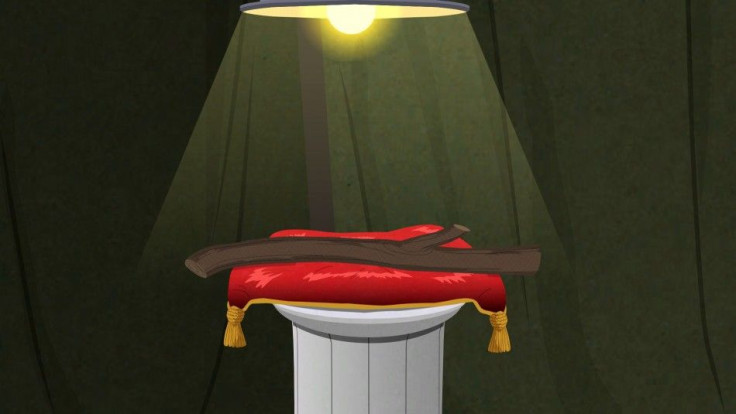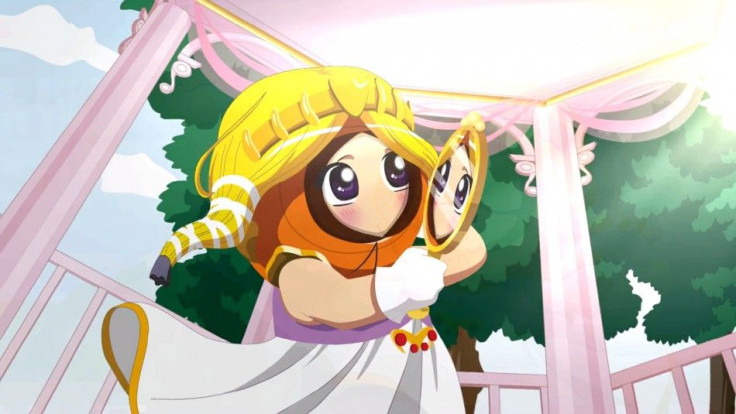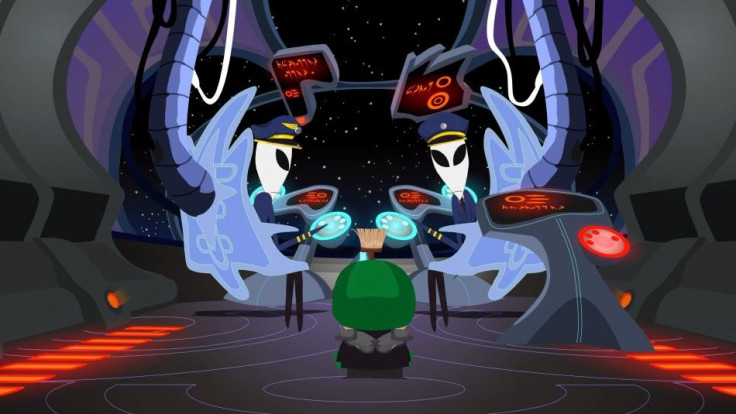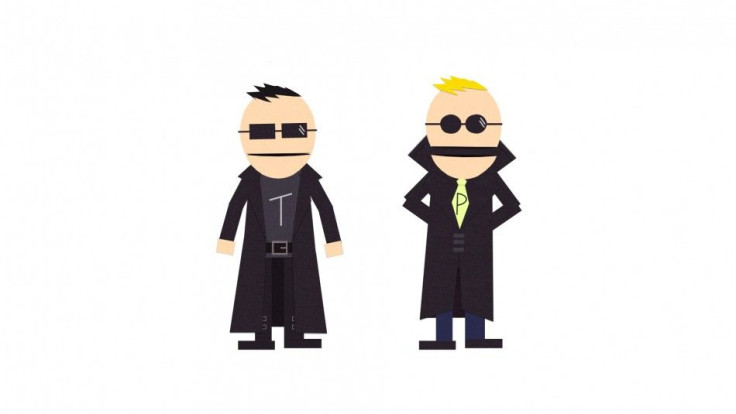DISCLAIMER: This South Park: The Stick Of Truth review was created using a Steam copy of the game that was provided to us, free-of-charge, by an Ubisoft representative; however, neither the publisher nor developer Obsidian Entertainment retained any say in the content of this article. Where I can, I've tried to avoid publishing spoilers from the South Park: The Stick Of Truth campaign, but those who don't want to learn anything about the game might want to just skip down to the final score.
It's been a couple of days since I watched the credits roll on South Park: The Stick Of Truth, which is generally more than enough time for me to complete a game review before the project in question hits the market. That said, my newfound inability to so much as think about South Park: The Stick Of Truth, without dropping everything I'm doing to go play it, very nearly kept me from having this very South Park: The Stick Of Truth write-up ready for your perusal on launch day.
Truth be told, I wasn't all-that-confident about South Park: The Stick Of Truth when I first sat down with the game last week. On top of the fact that South Park is based on a television license, in an industry far from renowned for its handling of such content, I can't possibly be the only fan who remembers the small collection of truly terrible South Park games released on the PlayStation, Nintendo 64 and Dreamcast more than a decade ago. Projects like South Park: Chef's Luv Shack and South Park Rally soured so many of us, on the idea of new South Park games, that it would have been near impossible for anyone who ever played such drivel to approach South Park: The Stick Of Truth with an entirely open mind.
To make matters worse, the road to retail hasn't exactly been a smooth one for South Park: The Stick Of Truth. Few outside of the old THQ board room could have predicted just how many obstacles the game would face on its path to publication. Originally revealed back in 2012, fans rejoiced when the now-defunct publisher confirmed it would hand developmental duties of a new South Park project to Obsidian Entertainment, with a new story to be penned by South Park creators Matt Stone and Trey Parker.
Then came bankruptcy.
For a time, some wondered if the THQ bankruptcy proceedings would ultimately spell doom for the project, and similar questions began to arise after South Park: The Stick Of Truth delays continued under the watchful gaze of Ubisoft. Sure, some fans found ways to stay optimistic about South Park: The Stick Of Truth throughout the game's development cycle, but I'd wager relatively few can say their faith never faltered along the way.
Thankfully, it was all worth the wait.
If imitation is the sincerest form of flattery, then there can be little doubt about just how much love the South Park: The Stick Of Truth dev team has for the rest of the video game industry. In fact, despite being announced and marketed as a traditional role-playing game, I lost track of all the different genres and games that have tribute paid to them during the South Park: The Stick Of Truth campaign.
The game casts you as the new kid on the block; a strong, silent-type who recently relocated to the quiet mountain town of South Park to escape a dark and mysterious past of some kind. As it turns out, the new house your parents have selected is the one directly adjacent to the Stotch residence, making Butters your new next-door neighbor. Naturally, your first encounter with South Park's least-capable child involves you coming to the poor boy's rescue, and it isn't long before Butters is spilling the beans about an imaginary war currently being played out by the children of South Park.
Like any modern game, the opening moments of South Park: The Stick Of Truth are dedicated to catching players up on the story, and getting you ready for the slight variations on traditional RPG combat that have been included in the game.

Much to my delight, South Park: The Stick Of Truth adopted the active combat mechanics found in classic Nintendo releases like Paper Mario or Mario & Luigi: Superstar Saga, which keeps combat from becoming the sort of thing you mindlessly button-mash your way through. Your abilities will differ based on the class you chose at the game's outset, either Knight, Mage, Thief or Jew, but all of the game's various spells, attacks and support commands tend to rely on button prompts in one way or another.
Once initiative has been decided, generally by a successful world attack, you and one of your party members will square off against up to 6 enemies at a time. Players are given the opportunity to carry out two actions per turn, provided one is a support move of some kind, and attacks each feature one or more button prompts that greatly affect the amount of damage conveyed by your techniques. Mastery of said button prompts doesn't appear to be necessary to complete the South Park: The Stick Of Truth experience, but I suspect most people will find they rarely (if ever) fall in combat once they've figured out the timing on each character's respective move sets.
The Stick Of Truth also features a very Guild Wars-esque focus on buffing and debuffing the various characters involved in each battle, with various attacks offering ways to decrease your enemies' armor levels, stun one of more opponents, conveying Gross Out (poison) damage to your foes and more. Enemies can also adopt stances that allow them to automatically reflect various types of damage, forcing players to alter their strategies on the fly in some cases. At first, it all seems a bit daunting, but those who pay close attention will soon find themselves nigh unstoppable on the field of battle.
After running through a handful of combat tutorials at the Kingdom of Kupa Keep -- yes, to the surprise of no one, Cartman found a way to include a KKK joke in his LARP -- you'll be given access to the vast majority of the South Park: The Stick Of Truth world map. There are a handful of locations that you'll find inaccessible, at least until you find new items/abilities to use on your adventure, but how you proceed from this point is largely up to you.

Over the next three days, you'll meet dozens of South Park residents, and play your part in the gradually unfolding war between Humans (led by Cartman) and the Drow Elves (led by Kyle). Stan and Princess Kenny make regular appearances throughout as well and, along with Jimmy and Butters, help fill out your six-person traveling party. Buddies can be swapped at-will in combat, giving you the ability to call upon better-suited party members if you find yourself poorly matched with your opponents at the start of a new encounter.
Those who take the time to carefully explore the town of South Park will also find themselves in possession of up to four items that allow once-per-day summoning of powerful allies like Jesus, Mr. Slave and City Wok owner Tuong Lu Kim. In a bit of a twist, South Park: The Stick Of Truth marks the first RPG in recent memory that doesn't allow you to summon help during boss encounters, though I still found the summons quite useful for keeping the action moving on rare occasions when I didn't feel like taking part in an extended battle. Even better, as with all things related to South Park, the brief sequences that follow your summoning of each ally provide plenty of laughs all their own.
Of course, that's where South Park: The Stick Of Truth really separates itself from anything that's emerged in the last couple of years. Without a doubt, South Park: The Stick Of Truth is the funniest game of the modern era, if not the funniest game of all time. The game is a veritable fire hose of comedic material, self-referential one-liners, and the most concentrated source of "f--ks" to emerge since The Wolf Of Wall Street crept into theaters last year.
Shockingly, South Park: The Stick Of Truth might feature one of the deepest character creation engines of any game in recent memory too; offering a range of avatar possibilities that might even parallel the customizability offered by some mid- and top-tier MMORPGs. That might sound crazy, considering the two-dimensional art style of the series that inspired the game, but I'm not kidding when I say South Park: The Stick Of Truth ships with so many personalization options than the selection really has to be seen to be believed.

Fawning aside, South Park: The Stick Of Truth isn't without its issues; however, the few complaints I do have about the game don't even begin to offset the incomprehensible number of ways that South Park: The Stick Of Truth stands above so many of the other video games I've played over the years.
At times, South Park: The Stick Of Truth relies a bit too heavily on the materials its seeks to parody -- I can't delve into this at all without getting into spoiler territory, but you'll see what I mean -- and I'd honestly be more shocked if some fans weren't as amused by some of the twists and turns that players encounter on the road to the game's final battle. I mean, let's be real here. Not everyone is looking to spend an entire Saturday experiencing an interactive fart joke -- though, to be clear, I was one hundred percent okay with it --and there's nothing wrong with thinking 12 hours of South Park's particularly-brash style of comedy is just a bit too much.
The avid collector in me was also a bit dismayed that South Park: The Stick Of Truth doesn't provide the standard "final encounter" warning until it was already too late to return to many of the game's stores, and also leaves a few collectables in locales that cannot be revisted. I'll also be the first to admit that combat rarely proved challenging in South Park: The Stick Of Truth, and is unlikely to appease anyone looking for encounters that require any serious forethought, planning or complex strategies. There's just enough complexity to keep combat from getting boring, but it won't take long for players to figure out the ideal build and skill rotation for their chosen class.
That said, South Park: The Stick Of Truth isn't meant to be a game that tests your patience. It's a story-telling experience, wrapped in an Obsidian-crafted RPG-lite shell seemingly meant to appease genre aficionados without weighing down casual South Park fans that don't have regular gaming habits.

South Park: The Stick Of Truth Review - Final Verdict
At the end of the day, breaking down the various parts of the South Park: The Stick Of Truth gameplay experience is pretty much the entire purpose of a game review, and yet relatively little actually needs to be said about this game when helping a prospective buyer make his/her purchasing decision.
Do you still enjoy episodes South Park? Do you like RPGs?
If you answered yes to both, there's a pretty good chance that you should probably start figuring out where you'd like to stop and get your copy after work/school, and cancel whatever plans you had for the evening. South Park: The Stick Of Truth is all you need now.
The Stick Of Truth offers the single-longest offering of South Park that has ever existed in any medium and, provided you aren't playing the game in one of the handful of countries where it was censored, in the uncensored format that so many wish Matt and Trey could always present their jokes. In all honesty, it's hard to think of a group of people who couldn't claim offense by some portion of the South Park: The Stick Of Truth experience, but that's sort of what South Park has been all about since Day One. More importantly, the game is (without a doubt) the funniest piece of entertainment that I've encountered since Dave Chappelle left his eponymous sketch show back in 2005.
Whether you consider yourself a casual fan of South Park, or the thought of playing the video game equivalent of a 12+ hour South Park marathon sounds like your idea of a great weekend, do yourself a favor and pick up a copy of South Park: The Stick Of Truth as soon as humanly possible. Really, so long as you don't have outright hatred for the show on which the game is based, I'd say you could do a lot worse with your sixty dollars than pick up a copy of The Stick Of Truth on your platform of choice.
Score - 4.5/5
Have you spent any time playing South Park: The Stick Of Truth since the game went on sale? Think we should have given South Park: The Stick Of Truth a perfect 5 out of 5? Don't understand why everybody is so in love with South Park: The Stick Of Truth?
Let us know in the comments section!

















